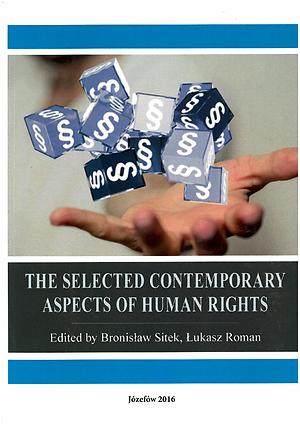Wydawnictwo
AWSGE
AWSGE

Akademia Nauk Stosowanych
WSGE
im. Alcide De Gasperi
WSGE
im. Alcide De Gasperi
BOOK

The selected contemporary aspects of human rights
Publication date
2016-10-03
ISBN
978-83-62753-74-1
Place
Józefów
Format
210x148
Binding
soft
Pages count
247
Editors
Bronisława Sitka i Łukasza Romana
Publisher
WSGE
CHAPTERS
9-24
The scope of the rights to life and health of prisoners
serving sentences in Polish prisons and the influence
exerted in the field by the judgments of the ECHR
Małgorzata Szwejkowska
25-38
Tax ethics and taxing powers
Salvatore Parente
39-74
The ethical foundation of human rights
Michele Indellicato
75-82
Muslim feminism
Marta Pietras-Eichberger
83-98
99-112
The Acquisition of Agricultural Real Estate in Poland
by Foreign Nationals – selected issues
Magdalena Rzewuski
113-128
The Basis for an Entry in a Land and Mortgage Register
Maciej Rzewuski
129-146
Proper management of access to public information,
as a realization of the needs and rights of citizens
Paweł Romaniuk
147-160
The legal and social aspect of freedom
of the incapacitated
Małgorzata Babula
161-176
177-192
The idea of social equality
in a meritocratic society – a cultural approach
Dorota Ferenc-Kopeć
193-206
207-220
The right of an entrepreneur running sole proprietorship
as a natural person to the protection of personal data
Magdalena Kędzior
221-234
Poverty reduction as human rights immanent
struggle Case India
Krystyna Polonka, Chitrang Vesuwala
235-247
ABSTRACT
We could witness the massive migration since the beginning of human existence.In modern times, the migrations were mainly limited to movement within the country, rarely between the countries.Basically, they have had the political or economic nature.The great migrations in the nineteenth and twentieth centuries was caused mainly by economic and (in totalitarian systems) political factors.During this period, a result of colonial policy, many people from Africa and Asia migrated to the Western Europe and the USA.
Europe is aging rapidly.The average life expectancy is longer, while simultaneous drastic drop in the number of births.A major problem is therefore a question of interchangeability of generations, care for the elder people, and many others.
The global exchange of information raises new human needs, ranging from simple living needs and ending with the goods of a higher order.Among others, thanks to the mass media, the universal awareness of the citizen’s right to information about activities of state bodies, to the so-called freedom rights, is growing.At the same time, the meritocracy, it means conditioning the man’s position in the society based on knowledge and skills, is reinforcing.
The issues of migration as well as the growing needs of citizens toward the growing political and economic immigration raise the question about the possibility limits of the Member States and the European Union itself, particularly about the financial and organizational limits.The USA have been facing these problems for at least 100 years.
The authors of the publications contain in this book are looking for the best solutions, in the areas circled by the human needs, for the citizens and the non-citizens, in connection with the possibilities of: the social security system, labour market, health care, homeland national and international security and the smooth functioning of state structures.





